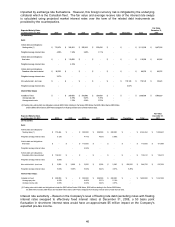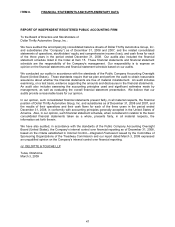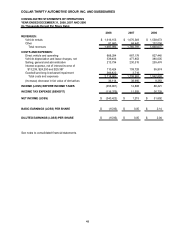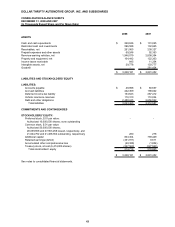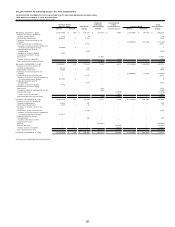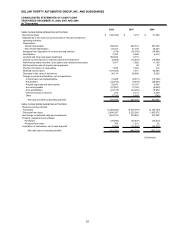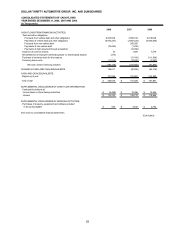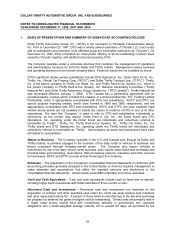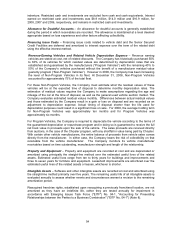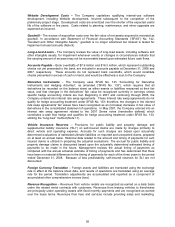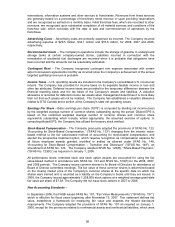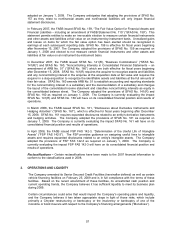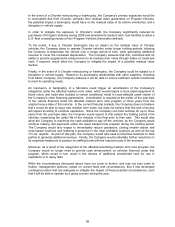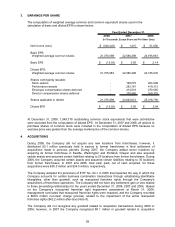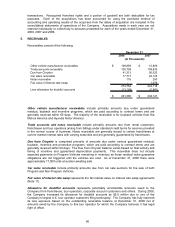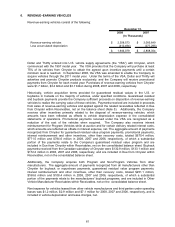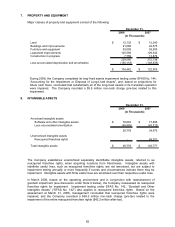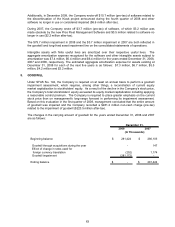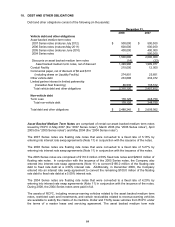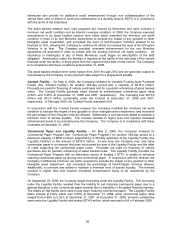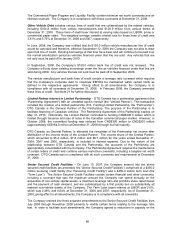Thrifty Car Rental 2008 Annual Report Download - page 58
Download and view the complete annual report
Please find page 58 of the 2008 Thrifty Car Rental annual report below. You can navigate through the pages in the report by either clicking on the pages listed below, or by using the keyword search tool below to find specific information within the annual report.reservations, information systems and other services to franchisees. Revenues from these services
are generally based on a percentage of franchisee rental revenue or upon providing reservations
and are recognized as earned on a monthly basis. Initial franchise fees, which are recorded to other
revenues, are recognized upon substantial completion of all material services and conditions of the
franchise sale, which coincides with the date of sale and commencement of operations by the
franchisee.
Advertising Costs – Advertising costs are primarily expensed as incurred. The Company incurred
advertising expense of $29.5 million, $34.1 million and $37.6 million, for 2008, 2007 and 2006,
respectively.
Environmental Costs – The Company’s operations include the storage of gasoline in underground
storage tanks at certain company-owned stores. Liabilities incurred in connection with the
remediation of accidental fuel discharges are recorded when it is probable that obligations have
been incurred and the amounts can be reasonably estimated.
Contingent Rent – The Company recognizes contingent rent expense associated with certain
airport concession agreements monthly as incurred since the Company’s achievement of the annual
targeted qualifying revenues is probable.
Income Taxes – U.S. operating results are included in the Company’s consolidated U.S. income tax
returns. The Company has provided for income taxes on its separate taxable income or loss and
other tax attributes. Deferred income taxes are provided for the temporary differences between the
financial reporting basis and the tax basis of the Company’s assets and liabilities. A valuation
allowance is recorded for deferred income tax assets when management determines it is more likely
than not that such assets will not be realized. The Company has established a valuation allowance
related to DTG Canada and a portion of the Company’s state net operating losses.
Earnings Per Share – Basic earnings per share (“EPS”) is computed by dividing net income (loss)
by the weighted average number of common shares outstanding during the period. Diluted EPS is
based on the combined weighted average number of common shares and common share
equivalents outstanding which include, where appropriate, the assumed exercise of options. In
computing diluted EPS, the Company has utilized the treasury stock method.
Stock-Based Compensation – The Company previously adopted the provisions of SFAS No. 123,
“Accounting for Stock-Based Compensation,” ("SFAS No. 123") changing from the intrinsic value-
based method to the fair value-based method of accounting for stock-based compensation, and
elected the prospective treatment option, which requires recognition as compensation expense for
all future employee awards granted, modified or settled as allowed under SFAS No. 148,
“Accounting for Stock-Based Compensation – Transition and Disclosure” ("SFAS No. 148"), an
amendment of SFAS No. 123. The Company adopted SFAS No. 123(R), “Share-Based Payment,”
(“SFAS No. 123(R)”) as required on January 1, 2006.
All performance share, restricted stock and stock option awards are accounted for using the fair
value-based method in accordance with SFAS No. 123 and SFAS No. 123(R) for the 2008, 2007,
and 2006 periods. The Company issues common shares to its Board of Directors for attendance at
Board of Director committee meetings. The fair value of these common shares is determined based
on the closing market price of the Company’s common shares at the specific date on which the
shares were earned and is recorded as a liability on the Company’s books until they are issued. In
2008, the Company issued approximately 1,258,000 stock options at a weighted average grant-date
fair value per share of $7.58. The Company did not issue stock options in 2007 or 2006.
New Accounting Standards –
In September 2006, the FASB issued SFAS No. 157, “Fair Value Measurements” (“SFAS No. 157”),
which is effective for fiscal years beginning after November 15, 2007. This statement defines fair
value, establishes a framework for measuring fair value and expands the related disclosure
requirements. The Company adopted the provisions of SFAS No. 157 as required on January 1,
2008, except for the provisions related to nonfinancial assets and nonfinancial liabilities, which were
56


